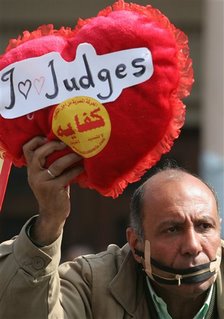 Thomas Friedman suggested that the King of Saudi Arabia should declare the next Arab peace initiative from the Israeli parliament.
Thomas Friedman suggested that the King of Saudi Arabia should declare the next Arab peace initiative from the Israeli parliament.A wild speculations from an out-of-touch western journalist? Perhaps. It would have been more so if the writer weren't Thomas Friedman, the journalist to whom King Abdullah of Saudi Arabia,
rather weirdly, first announced his Peace Plan back in 2002.
Tom Friedman's articles are regularly translated into Arabic in
Al-Sharq Al Awsat and
Al-Arabiya, (with few exceptions like
this anti-Saudi
article) both Saudi establishment media outlets. So Friedman, more than any other western journalist, is supposed to have the Saudi "ear".
Still, it is unclear whether
today's article was a leak to prepare the public or simply unsolicited advice (more likely). What did he say?
Friedman starts by saying that Saudi Arabia has become "the new Egypt", the new leader in the Arab world, and praises the kingdom for its assertive diplomacy and its king's "integrity". Then he goes straight to the beef:
What the moribund Israeli-Palestinian talks need most today is an emotional breakthrough. Another Arab declaration, just reaffirming the Abdullah initiative, won’t cut it. If King Abdullah wants to lead — and he has the integrity and credibility to do so — he needs to fly from the Riyadh summit to Jerusalem and deliver the offer personally to the Israeli people
Then Friedman goes to the nuts and bolts of his "humble suggestion":
the Saudi king [should] make four stops. His first stop should be to Al Aksa Mosque in East Jerusalem, the third holiest site in Islam. There, he, the custodian of Mecca and Medina, could reaffirm the Muslim claim to Arab East Jerusalem by praying at Al Aksa.
[..]
From there, he could travel to Ramallah and address the Palestinian parliament, making clear that the Abdullah initiative aims to give Palestinians the leverage to offer Israel peace with the whole Arab world in return for full withdrawal
[..]
From there, King Abdullah could helicopter to Yad Vashem, the memorial to the six million Jews killed in the Holocaust. A visit there would seal the deal with Israelis and affirm that the Muslim world rejects the Holocaust denialism of Iran. Then he could go to the Israeli parliament and formally deliver his peace initiative."
Alright, I guess he
is just an out-of-touch Western journalist.

























